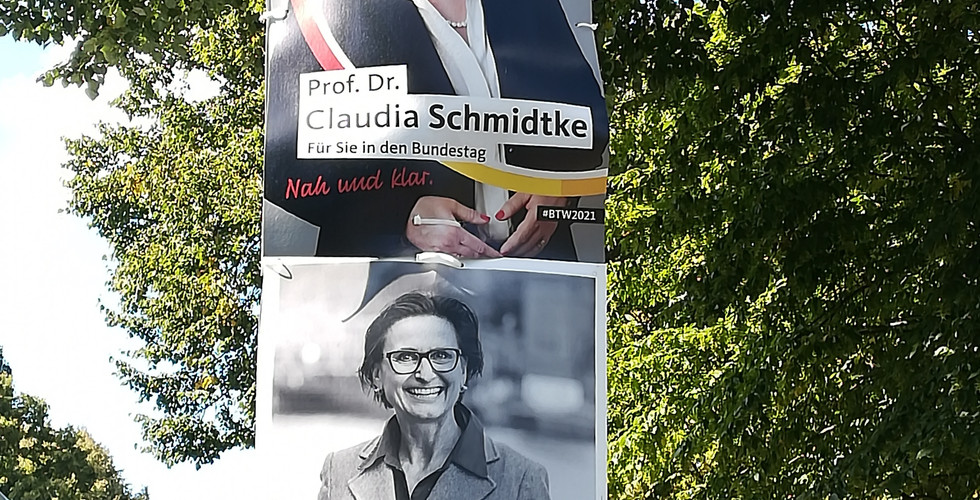How to election in German?
- learngermanonline0
- Sep 23, 2021
- 10 min read

You might know that on September 26th, Germany will hold elections. Whereas German elections are a lot calmer than American elections, they are equally important, and you might wonder how exactly the Germans do elections. We are here to shed some light on that.
When are elections held?
In Germany, elections are always on a Sunday. On Sundays, most Germans don't work, so they can go to their "Wahllokal" (voting location) and cast their ballot without having to take a day off. This year the election will be held on September 26th.
How often is Germany holding elections?
The elections for the Bundestag (parliament) are held every four years.
What is getting elected?
You might think that these elections are about electing the new chancellor. And they are - kind of. The chancellor, however, is not elected by the people directly. Instead, Germany is electing the "Bundestag," which is Germany's Parliament, on September 26th. The members of the German Bundestag are called "Abgeordnete/r." So what does the Bundestag do, and how is the Chancellor elected?
The Bundestag passes new laws or amends laws that already exist.
It approves treaties with other states.
Also, it decides on the budget, i.e., how much money is spent on what. It decides, for example, how much money is spent on new highways or railroads.
The Bundestag controls the federal government. Therefore, the federal government must report what the federal government has done and what it wants to do to the Bundestag.
Additionally, it decides on the deployment of the Bundeswehr.
And finally, it also elects the Chancellor.
Depending on how many seats a party has, the bigger their majority is to "decide" who becomes chancellor.
According to Germany's constitution, the Bundestag has 598 members. However, the number is not fixed due to so-called "Überhangs- and Ausgleichsmandate." As a result, the current Bundestag has a staggeringly high member count of 709.
Voters in the federal election cast two votes: With the first vote (on the left side), one votes for a direct candidate in their constituency (also constituency vote). The candidate enters parliament directly as soon as they have achieved a relative majority of the votes.
The so-called second vote is cast with a cross on the right side of the ballot paper. The result of the second vote is decisive for the distribution of seats in parliament. In the distribution, first, those MPs are taken into account who has won the mandate in their constituency directly based on the first vote result - also called a Direktmandat - direct mandate. The remaining seats are then allocated to candidates on the parties' predetermined state lists. A party and its state lists are only considered if it has received at least five percent of the second votes cast or at least three direct mandates. Parties that receive less than 5 % do not get to be part of the parliament. Thus, the votes cast for these parties are "lost." That sounds more complicated than it is. Let me give you a (very) simplified example:
Imagine 100 people cast their votes in total and there is a total amount of 100 members of the parliament and the following votes are cast:
35 people vote for the CDU = 1st step: 35 % -->2nd step: 41.18 % = 3rd step: 41 % of the seats 20 people vote for "Die Grünen" = 1st step: 20 % --> 2nd step: 23.53 = 3rd step:24 % of the seats 20 people vote for the SPD = 1st step: 20 % --> 2nd step: 23.53 = 3rd step:24 % of the seats 2 people vote for the FDP = 1st step: 2 % --> lost votes 10 people vote for "Die Linke" = 1st step: 10 % --> 2nd step: 11.76 = 3rd step: 12 % of the seats 13 people vote for any of the other parties = 1st step: 13 % --> lost votes
In this case, the parliament would end up with 41 people from the CDU, 24 people from "Die Grünen," 24 from the SPD, and 12 from "Die Linken."
After the election, when it is determined who will be part of the parliament, the parliament must decide who will govern Germany. If a party has received a clear majority, this party will govern. Because they hold the majority of the parliament, their candidate for chancellor will be elected in the parliament.
However, one party rarely wins a clear majority. More common is that the party that won the most seats does not have a clear majority alone. Then they need to find a "Koalitonspartner" (coalition partner) with whom they DO have a majority and with whom they will govern. Then both parties have to determine who will be chancellor and who will become "Minister" (secretary) of the departments. So far, the "winner party" has always been the one who had their candidate become chancellor.
Who is NOT elected?
Many foreigners do not know that Germany has a chancellor AND a president. The president is called Bundespräsident:in. The Bundespräsident:in is the head of state. Thus, they are the highest representative of the country. However, they do decide rather little. Their main tasks are to appoint the Chancellor and the Federal Ministers, sign laws, award medals, and give speeches. Therefore, they have mainly representative duties.
The Bundespräsident:in in Germany is elected by representatives of the people, not the citizens or the Bundestag. The current President of Germany is Frank-Walter Steinmeier. Whereas Angela Merkel was the first female chancellor, there has never been a female Bundespräsidentin.

Who are the parties, and what do they stand for?
Germany has many, many, many, many parties. Below you can see this year's ballot (Berlin-Charlottenburg/Wilmersdorf) and the 26 parties that are competing there. You might recognize some of the parties, but you might also be surprised to find the "V-Partei," a party for "change, vegetarians, and vegans," "du. The urban. A Hip-Hop party," "Die Grauen," a party for old people, or "Die Tierschutzpartei" - the animal protection party.
Below you can find a short profile of all parties currently in the parliament. The information is taken from the Bundeszentrale für Politische Bildung (Federal Agency for Civic Education)
CDU
The CDU was founded in 1950 as a rallying party of the Christian bourgeois camp. Since then, it has played a vital role in shaping the Federal Republic's critical foreign and domestic policy decisions as a governing party. Its program is characterized by conservative, liberal and Christian-social positions, the modernization of which repeatedly touches on core elements of the party's identity.
Chancellor candidate: Armin Laschet
CSU
The CSU only contests elections in Bavaria, where it governed without a coalition partner from 1966 to 2008 and 2013 to 2018. In the Bundestag, it forms a joint parliamentary group with the CDU. The CSU sees itself as a bourgeois-conservative rallying party, invoking non-denominational Christian positions and advocating more Bavaria sovereignty.
Chancellor candidate: Armin Laschet
SPD
Despite its more than 150-year history, the SPD became the strongest party nationwide for the first time in the 1970s. In the Federal Republic, it has been represented in various government coalitions and provided the Chancellor for 20 years. Since its programmatic opening in 1959, it has adhered to its core values of freedom, justice, and solidarity.
Chancellor candidate: Olaf Scholz
Die Grünen
DIE GRÜNEN was founded in protest against environmental destruction, the use of nuclear energy, and nuclear armament. In 1983, the party succeeded in entering the Bundestag for the first time. Between 1998 and 2005, the Greens were part of a federal government with the SPD. Contrary to their pacifist tradition, the Greens also approve of foreign deployments of the Bundeswehr.
Chancellor candidate: Annalena Baerbock
Die Linken
DIE LINKE became firmly established as a parliamentary force in the German party system in 2005. It emerged from the WASG and the PDS. It thus has its roots both in the pro-union environment and the protest against the social policies of the 2000s and in an East German regional party formed in 1990 as the successor to the GDR state party SED.
Chancellor candidate: Janine Wissler and Susanne Hennig-Wellsow
FDP
The FDP was founded in 1948. As the only small party, it occupied a key position and was represented in numerous federal governments during its long period. From 2013 to 2017, it was not represented in the Bundestag for the first time. Its liberal economic positions and restrictive stance on refugee and European policy have an above-average reach among higher-income voters.
Chancellor candidate: Christian Lindner
AfD
The AfD was founded in 2013 in response to measures to combat the European currency crisis. With restrictive positions on immigration policy, a conservative social policy, and an "anti-establishment" orientation, it has since joined the right-wing populist party family. It has been successful in all elections since 2014 and has been in the Bundestag since 2017 (although many people consider the AfD, an anti-democratic party.)
Chancellor candidate: Tino Chrupalla and Alice Weidel.
Who can vote?
You may vote if you
are at least 18 years old
have German citizenship, or
have a German identity card and have a residence in Germany for at least three months.
There are special rules for Germans who live abroad. If you live abroad, you have to request having your ballot be sent to your address. You are only able to vote via absentee ballot.
If you are eligible to vote, you are automatically on the electoral roll. No German has to do anything to be put on the electoral roll. Your right as a German is to participate in elections, and, therefore, the government must guarantee that you CAN vote. A person may only vote once in a federal election.
Since 2019, all disabled people are also allowed to vote. Until 2019, certain groups were not allowed to vote. For example, people who had a guardian were not allowed to vote. After committing a crime, people who are incapacitated and in a psychiatric hospital were also not allowed to vote. In 2019, however, the Federal Constitutional Court changed that in a ruling. Reasons for the ruling were: Excluding certain groups from the right to vote is against the Constitution.
Where can you vote?
Similar to the US, your ballot tells you where you need to go to cast your ballot. The spot is usually a close-by school. However, everybody can always choose to vote via "Briefwahl" (absentee ballot.) No reasons are needed to choose to vote via absentee ballot. In this case, your ballot will be sent to your home, and you only need to post it in time to arrive before election day. Not even a stamp is necessary if you live in Germany. Everything is taken care of.
You can see below how the absentee ballot works:
How to decide whom to vote for and how do parties finance the election campaign?
But how to determine for whom to vote? In Germany, the culture around elections is very different than in the US. First off, parties in Germany spend a lot less money on election campaigns than the parties in the US (approx.100 million Euro in Germany 2021 vs. $ 11 billion in the US 2020).
Parties in Germany are financed by public and private funds. However, because government grants may not exceed self-generated income, how the party has performed in elections is no longer decisive for campaign expense reimbursement as it was a couple of years ago.
In federal and European elections, the parties receive an annual refund of 1.00 Euro per vote for the first four million valid list votes. A prerequisite is that the parties share the vote of over 0.5 percent (in European and federal elections) or over 1.0 percent (in state elections). Each additional vote yields 83 cents per year. There is no reimbursement for local elections.
In addition to this basic expense, a subsidy independent of the election campaign is introduced. The parties will receive 45 cents for each euro of contributions and donations they collect, provided the contributions come from natural persons and do not exceed 3,300 Euros per person per year. In addition to the "relative cap," according to which the subsidy for a party may not exceed its self-generated profit, the annual party funding is capped. In 2016, this "absolute cap" was 160,519,363 Euros. Each year, the absolute cap is adjusted based on a legally regulated dynamic.
So how do parties spend this money during an election campaign?
- Wahlplakate (Election posters)
A couple of weeks before every election, parties start putting out their "Wahlplakate" (election posters.) Wherever you go, you will find these posters. Unfortunately, as you can see below, they do not elaborate much, and often you only see a photo of the candidate and a short (sometimes catchy) slogan. Still, for many Germans, that is the extend of party information they are exposed to.
- Fernsehduell
Another way to learn more about the parties is the so-called "Fernsehduelle," in which the chancellor candidates of the big parties were meeting for tv debates to discuss their plans and opinions. If you expect these events to be like those you know from the US, you will be disappointed. Often they are pretty dull and somewhat timid (which isn't necessarily a bad thing...).
- Radio/TV
Parties are also allowed to advertise on television and radio before a federal election in short commercials. But they cannot determine when or how often the spots are shown. If they did, one party could have many commercials shown, for example, and there wouldn't be enough time for another party. So the broadcasting times have to be distributed fairly. That's why the stations work out a precise schedule for the commercials. But how much airtime a particular party gets depends on how important it is, i.e., how many people voted for it in the last election.
- Wahlomat
A very popular tool to decide on whom to vote for is the "Wahlomat." The Wahlomat asks you several questions that you answer and rate according to importance. In the end, the Wahlomat tells you which party aligns the most with your opinions. However, it also shows how much your beliefs align with all other parties. Thus, the Wahlomat is an excellent tool for everyone who does not want to read the party manifests.
- Parteiprogramme
Each party publishes a so-called "Parteiprogramm" (party manifest) that should state what they stand for and what they intend to do. Unfortunately, they are often relatively vague and difficult to understand (also mostly forgotten as soon as a party is elected.) However, they are also available in "leichter Sprache" (easy language), which are supposed to be understood by everyone.
Why does this election matter?
So why does this election matter?
You might have heard of Chancellor Merkel (CDU.) She has been governing Germany for the last 16 years but has decided not to run again. However, Germany does not have any limitations on how many times a chancellor can be reelected. Chancellor Merkel was hugely popular despite accusations of doing nothing on important issues, not making clear statements, and taking risks. With her not running again, the chances of another party receiving the majority of votes have increased. Furthermore, the candidate of her party (CDU) is pretty unpopular.
In addition, the right-wing-party AfD had joined the Bundestag in the last election. Many people were very shocked and surprised that Germans had elected a right-wing party into their parliament, and they hope that it was a one-time thing that won't be repeated in this year's election. However, the fact that racism and antisemitism in Germany are gaining momentum once again is highly concerning. The newly elected Bundestag will have to find a way to fight these trends. A parliament without the AfD would make that easier.
Another reason this election matter is the climate crisis. Although many of the big parties claim that they are concerned about climate change (most Germans do believe that climate change is real and a danger), only a few parties deem it urgent enough to change politics right now.
Do you have questions about the German elections? Drop them below!
If you like our blog, please share and subscribe! Also, if you have an interesting story re German(y) or would like to get interviewed, we would love to hear from you!



































Comments